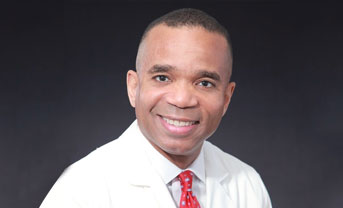
Herbert Smitherman Jr., M.D., M.P.H., F.A.C.P., the assistant dean of Community and Urban Health for the Wayne State University School of Medicine, has been appointed interim vice dean of Diversity and Inclusion.
Dr. Smitherman will serve in the new position on an interim basis while a search for a permanent vice dean of Diversity and Inclusion is conducted. He will continue in his role as assistant dean of Community and Urban Health.
Jack D. Sobel, M.D., dean of the School of Medicine, announced the appointment June 6, noting that the vice dean of Diversity and Inclusion is a new office that was recommended by the Wayne State University School of Medicine Diversity and Inclusion Task Force. The task force submitted its findings to Dean Sobel in May.
"I established this task force, co-chaired by Dr. Smitherman, to develop recommendations to help rectify the decade or so decline in the enrollment of under-represented minority medical students," Dean Sobel said. "I am committed to rectifying this problem and returning our School of Medicine to its position as the nationally recognized leader that it once was in recruiting qualified minority medical student candidates. Dr. Smitherman will help us do that, and help us define the role of this new position while we search for candidates."
"We will need everyone's help to improve diversity within our institution," said Dr. Smitherman, noting that the task force's report was shared with faculty, staff and students at the School of Medicine. "It is the right thing to provide opportunity for all. As interim vice dean of Diversity and Inclusion, I will begin to consolidate under one School of Medicine office all pipeline and diversity-based programs and assist the school in increasing the number of underrepresented minorities, not only at the medical student level, but also at the resident, fellowship, faculty and staff levels. I look forward to working with the entire School of Medicine community in assisting bringing the school back to its historic prominence related to diversity."
Elected in May as president of the Wayne County Medical Society of Southeast Michigan and chair of the Detroit Wayne Mental Health Authority, Dr. Smitherman has been a member of the School of Medicine faculty for 25 years. He is an associate professor of Internal Medicine for the School of Medicine and for the Barbara Ann Karmanos Cancer Institute.
He also serves as president and chief executive officer of Health Centers Detroit Foundation Inc., a Federally Qualified Health Center Look-Alike that operates three health centers in Detroit under the name Health Centers Detroit Medical Group.
Dr. Smitherman has devoted himself to working with diverse communities to develop urban-based primary-care delivery systems that integrate the health, social goals and concerns of the community. He has committed more than two decades to providing quality medical care to underserved populations. In 2007, he and four co-authors published "Taking Care of the Uninsured: A Path to Reform," which detailed the 10-year path of the Voices of Detroit Initiative. The project, launched in 1998 with a $5 million grant from the W.K. Kellogg Foundation, sought to ease the strain on emergency rooms relied upon by the uninsured as primary care facilities by providing access to true primary care. Originally tasked with addressing the primary care needs of 27,500 patients, the initiative surpassed that goal by assisting 33,093 uninsured Detroit residents in receiving access to basic primary care services.
He also served as co-chair of the $16.2 million U.S. Department of Health and Human Services Southeast Michigan Beacon initiative launched in 2012. That program used mobile phone text messaging and IT Healthcare Exchanges to engage diabetic patients to take better control of the self-management of their condition.
He has spoken nationally on health care disparities and has been invited to the White House several times to speak on that issue and others.
"Shifting U.S. demographics means we need to have a greater understanding of a variety of different cultures. In the 21st century, knowing how to work within our culturally diverse society is essential to meeting the health care needs of the nation, improving health outcomes, reducing health disparities and eliminating health inequities, especially among underserved populations," Dr. Smitherman said. "Recently there has been a sharp decline in the number of underrepresented minority students admitted to and graduating from the School of Medicine. These diversity deficits were also identified by the Liaison Committee on Medical Education during its recent site visit not only at the medical student level but also at the resident, fellowship, faculty and staff levels."
The WSU Center for Peace and Conflict Studies honored Dr. Smitherman with its annual Peacemaker Award in 2008, recognizing him for "monumental achievements and contributions to multicultural awareness and constructive conflict resolution." The Michigan State Medical Society, in 2009, presented him with its Community Service Award for his efforts to battle health care disparities. In May, Michigan Gov. Rick Snyder appointed him to serve as a member of the state's new Human Trafficking Commission.
Dr. Smitherman received his undergraduate degree in chemical engineering from Northwestern University in Evanston Ill., and his medical degree from the University of Cincinnati College of Medicine in 1987. He completed an internal medicine internship and residency in 1990 at the Wayne State University School of Medicine, and was named chief medical resident of the Veterans Administration Medical Center in Allen Park in 1990. He received his master's of public health degree in health service administration from the University of Michigan in 1994. He also completed the National Health Care Forum Creating Healthy Communities Fellowship and is an International Salzburg Healthcare Fellow, where he was invited to spend time in Salzburg, Austria, to participate with health care experts from around the world in 2002 at the Salzburg Center. He has completed special course work in international economics and U.S. macroeconomics at Amherst College, in Amherst, Mass., and health care economics and conflict resolution at Harvard University.